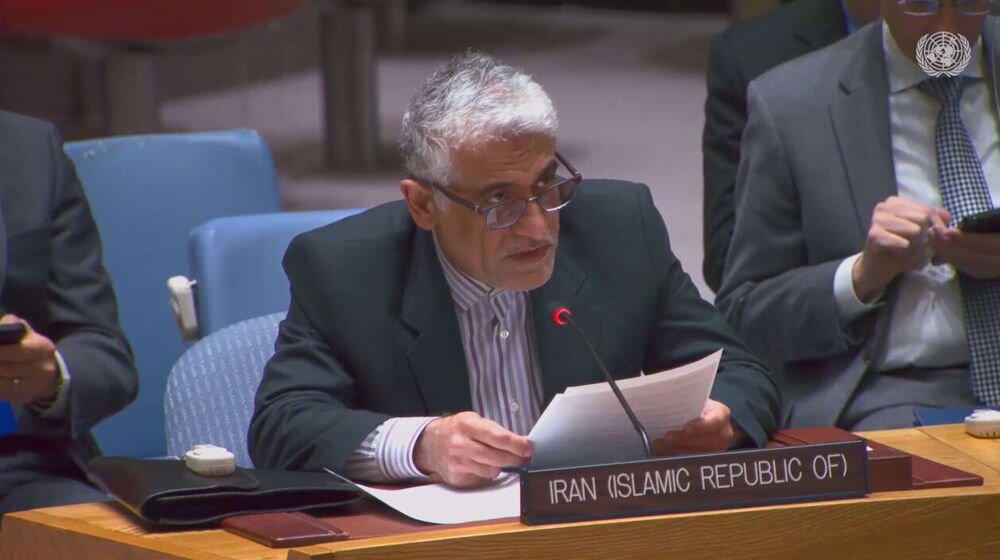Iran’s UN envoy emphasizes efforts to combat extremism in Afghanistan

TEHRAN – Iran's ambassador to the United Nations has underscored the nation's proactive efforts in addressing extremism and underdevelopment in Afghanistan, declaring Iran's readiness to actively participate in the reconstruction of its neighboring country.
Speaking at a United Nations Security Council meeting focused on the urgent need for humanitarian assistance in Afghanistan, Amir Saeid Iravani highlighted the dire economic and humanitarian crises facing the war-torn nation.
Iravani painted a grim picture of Afghanistan's current situation, exacerbated by a drastic reduction in international aid. "Afghanistan continues to face severe economic and humanitarian crises, worsened by a significant reduction in international aid. This situation is profoundly affecting many people, particularly women and children," he stated. He referenced United Nations estimates indicating that 23.7 million Afghans will require humanitarian assistance in 2024.
“However, by May 15, only 16.2% of the required $3.06 billion had been raised to help 17.3 million people. This instability affects neighboring countries, highlighting the need for regional and international cooperation and engagement,” he referenced, emphasizing the need for greater help toward the war-stricken country.
Reflecting on Afghanistan's tumultuous history, Iravani pointed to the decades-long U.S. occupation and the chaotic withdrawal that led to the Taliban's swift takeover. He warned against the "politicization of aid," emphasizing that it would be detrimental to the Afghan people. Iran, he said, is committed to tackling extremism, terrorism, and underdevelopment in Afghanistan and is prepared to contribute actively to the nation's rebuilding efforts.
“Iran remains committed to supporting Afghanistan, keeping its borders open to Afghan displaced and refugees during critical times and challenges the Afghan people faced, and hosting more than six million Afghans at an annual cost of 10 billion dollars despite sanctions,” he noted.
Iravani elaborated on Iran's ongoing economic and commercial relationships with Afghanistan, aimed at fostering peace, stability, and economic growth.
“To promote peace and stability and strengthen the Afghan economy, Iran continues economic and commercial ties with Afghanistan, focusing on projects like Chabahar port, railways, and alternative crop cultivation to curb drug production,” he added.
Iravani also expressed concerns about the persistent terrorist threats emanating from within Afghanistan, doubting the Taliban's capability to effectively counter these threats.
"Continuous international engagement with the de facto authorities is essential for regional peace and stability," he noted.
The Iranian envoy highlighted the broader regional implications of Afghanistan's instability and stressed the importance of regional and international cooperation. He reaffirmed Iran's commitment to supporting Afghanistan, maintaining open borders for displaced Afghans and refugees during critical times.
Iravani also pointed to the severe economic strain Iran faces due to U.S. sanctions and the lack of international support, making it difficult to manage the influx of Afghan refugees and the associated drug trafficking issues alone. He called on the international community to offer swift, sufficient, and continuous support to host countries like Iran.
“The Iranian public is frustrated by the lack of international support in managing the refugee and drug trafficking crises. The international community must provide swift, sufficient, and continuous support to host countries like Iran,” he further commented.
Furthermore, Iravani urged the unfreezing of Afghanistan's assets held by Western countries, insisting that sanctions should not impede economic revitalization efforts. "Western countries, having occupied Afghanistan for over 20 years, must honor their commitments to the country's reconstruction and the fight against terrorism," he asserted.
Iravani also underscored Iran’s active engagement with regional initiatives aimed at fostering dialogue with Afghanistan, such as neighboring ministerial meetings and the Moscow format.
“Iran supports Pakistan's initiative to convene meetings of foreign ministers from Afghanistan's neighboring countries, with four rounds already held and a fifth scheduled in Ashgabat,” he mentioned.
He also noted the regional contact group that was established at Iran's initiative, including representatives from Iran, Pakistan, China, and Russia. Two rounds of these meetings have been conducted so far, according to Iravani. He continued, “During the second meeting held on 8 June in Tehran, the participants expressed deep concern about the situation in Afghanistan, particularly the ongoing foreign-backed terrorist threats emanating from the country and affecting neighbors and regions.”
“Iran advocates for addressing extremism, terrorism, and underdevelopment in Afghanistan and stands ready to play an active role in its reconstruction. Iran welcomes the next round of the Doha process scheduled for June 30 and 1st July 2024,” Iravani further stated.
In conclusion, Iravani's remarks at the UN Security Council meeting serve as a stark reminder of the ongoing challenges in Afghanistan and the critical need for international solidarity and support to address the multifaceted crises impacting the nation and the region.
Following Taliban's return to power in August 2021, the United States-led foreign forces withdrew chaotically from the country which led to the rapid collapse of Afghanistan’s U.S.-trained security forces.
Iran has repeatedly stated that resolving Afghanistan’s problems lies in Afghan-led solutions, overcoming unilateralism, achieving internal cohesion, and addressing social and economic demands, which are key to building a peaceful and prosperous Afghanistan.
Leave a Comment